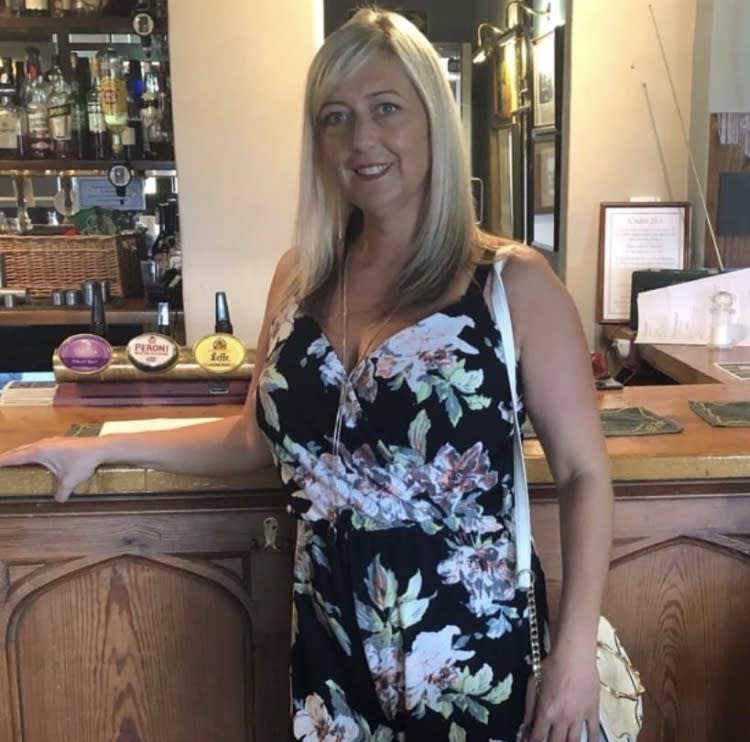Crohn's patient urges government to open public toilets for those who cannot hold it

A woman with Crohn’s disease is urging the UK government to open public toilets as we ease out of the coronavirus lockdown.
Toni Kelly, 43, from Middlesex, has suffered from inflammatory bowel disease since she was 17.
Although she has learned to live with the condition, major surgery means she needs to go to the toilet as often as seven times a day.
Refusing to stay entirely indoors as restrictions relax, Kelly has been forced to go home after finding public bathrooms locked.
Claiming her life “centres around toilets”, the Heathrow airport worker feels discriminated against.
Government officials are allowing outdoor gatherings of a maximum of six people, providing social distancing is maintained.
Non-essential shops have also reopened, however, the availability of public toilets varies.

“I feel it’s very unfair; some of us can still go out but our lives are centred around toilets,” Kelly told Yahoo UK.
“If I’m planning a day out, I need to know where the toilet is.
“It’s a lifestyle for me and hundreds of others.
“Now you’re restricted, you feel discriminated against.”
Kelly describes the pain of not using the toilet as similar to wind, with her being unable to hold it in for long.
A recent BBC article left her overwhelmed by messages of support and thanks from similar patients.
“Even people without bowel disease say their children won’t go to the toilet in the bush, so they can’t take the children out,” said Kelly, who is working with Crohn’s & Colitis UK.
‘We want toilets open and safe’
Although the exact causes of Crohn’s are unclear, it may come about due to the immune system mistakenly attacking the digestive tract.
Immunosuppressants are therefore often prescribed to dampen flare-ups.
These also reduce the activity of the patient’s immune system, leaving them more vulnerable to infections.
Kelly stopped taking immunosuppressants several months ago when she developed a bone infection in her leg, which she is awaiting surgery for.
She was one of the 1.5 million vulnerable people who received a letter telling them to self-isolate entirely for 12 weeks at the beginning of lockdown.
Her doctor believes, however, authorities may not have realised she was no longer taking the immune-suppressing drugs.
“When COVID kicked in I hadn’t been off them long,” said Kelly.
Claiming she would “go crazy” if she stayed in all day, Kelly has been cautiously leaving the house.
“I’ve been to places where the toilets are closed and I have had to come home,” she said.
“I have to look online to see if public toilets are open where I’m going. I have to plan.”
Kelly’s condition means she has a Radar key that usually gives her access to more than 9,000 toilets in the UK.
A recent trip to the park left her disappointed by the state of the disabled facilities.
“[There was] no soap dispenser, just a little bit of soap on the side and I'm not touching that,” she said.
“No paper towels, no sanitisers, no cleaners around.
“We want to see toilets open and make them safe as well.”
Although the coronavirus mainly spreads via coughs and sneezes, there is evidence it may also be transmitted in faeces.
A study also suggests the pathogen can survive on surfaces for up to three days.

‘This is a deprivation of our human rights’
Kelly was initially diagnosed with ulcerative colitis. Often considered a milder form of Crohn’s, it only affects the colon and rectum, rather than any part of the digestive system.
She was fitted with an ileostomy bag, where the small intestine is diverted through an opening in the abdomen and waste is collected out of the body.
Things took a turn for the worse when at 24, while four months pregnant, Kelly’s large bowel was at risk of perforation.
Her entire colon and rectum had to be removed, with doctors warning the baby would not survive.
“My daughter is 19 now,” she said. “They called her a miracle baby.”
Fitted with another ileostomy bag, doctors recommended a J pouch.
This involves the end of the small intestine being taken to form an internal compartment, often shaped like a J.
The pouch connects to the anus, allowing patients to pass faeces.
A complication of the surgery is increased bowel movements, with some patients going up to 12 times a day. This usually eases over time.
Hoping the worst was over, Kelly went on to develop Crohn’s.
Amid the coronavirus lockdown, she has launched a campaign to have public toilets “safely reopened”.
“This is essential to those with hidden disability’s such [as] Crohn’s & colitis, IBD [inflammatory bowel disease], prostrate cancer, urinary incontinence and the list goes on,” Kelly wrote on Change.org.
“As lockdown is eased and more people are being able to go for walks and picnics, many people across the UK are still homebound due to the lack of toilets being opened.
“This needs to be looked into urgently as this is a deprivation of our human rights.”
A Ministry of Housing, Communities and Local Government spokesperson told Yahoo UK: “While decisions to reopen public toilets are for councils, we strongly encourage them to open wherever possible.
“We’ve published guidance to help them ensure facilities are safe where they are open including increasing cleaning of touch points.”
Larger shopping centres in England have opened their toilets, but warned customers to expect reduced capacity.
Coronavirus: what happened today
Click here to sign up to the latest news, advice and information with our daily Catch-up newsletter
Read more about COVID-19
How to get a coronavirus test if you have symptoms
How easing of lockdown rules affects you
In pictures: How UK school classrooms could look in new normal
How public transport could look after lockdown
How our public spaces will change in the future
Help and advice
Read the full list of official FAQs here
10 tips from the NHS to help deal with anxiety
What to do if you think you have symptoms
How to get help if you've been furloughed



